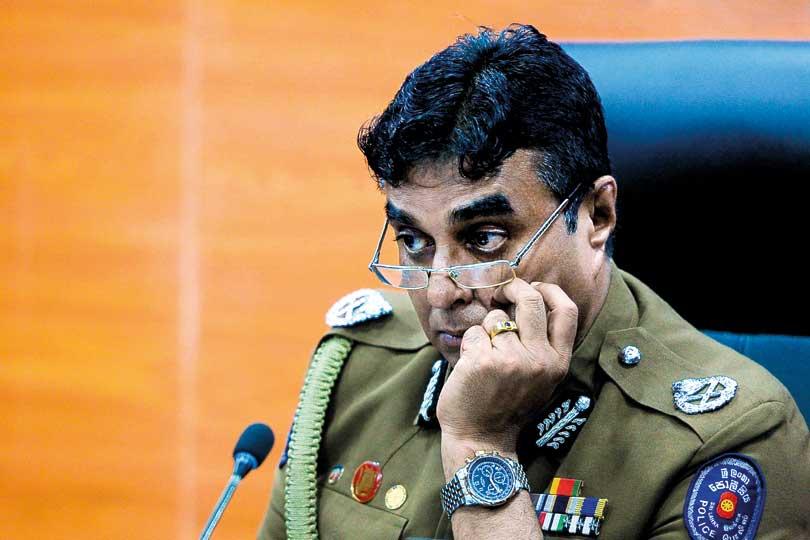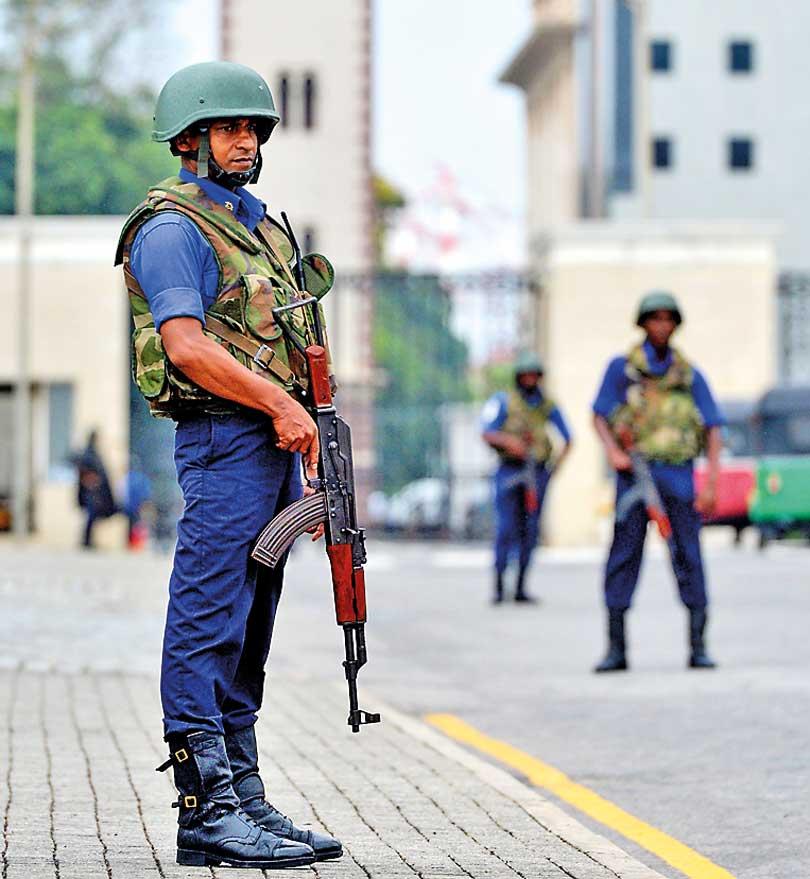Reply To:
Name - Reply Comment

The IGP has defied the President’s request ostensibly because he knows well that he cannot be expelled from office that easily
 The threat of terrorism from Islamic State (IS) showed signs of dissipating during the last few days following the arrest of masterminds behind the attack. The government halted imposing curfew, and people returned to the streets more and more during the last couple of days. However, things cannot be taken for granted as the threat has not disappeared fully.
The threat of terrorism from Islamic State (IS) showed signs of dissipating during the last few days following the arrest of masterminds behind the attack. The government halted imposing curfew, and people returned to the streets more and more during the last couple of days. However, things cannot be taken for granted as the threat has not disappeared fully.
Now is the time for the government to respond to this man-made disaster and to restore normalcy. President Maithripala Sirisena intended to bring about an overall change in the police and defence hierarchy. Yet, his hands are legally tightened.
Defence Secretary Hemasiri Fernando resigned from office upon a request by the President enabling him to appoint one time Army Commander Shantha Kottegoda as the new Defence Secretary. But, Inspector General of Police (IGP) Pujith Jayasundara did not accede to the President’s request to resign. It resulted in a gridlock in the process of revamping the defence and law and order apparatus of the country because the President has no authority to remove him from office.
The Removal of Officers (Procedure) Act No.5 of 2002 applies in regards to the removal of the IGP and the Attorney General from office.
The Act stipulates that a motion signed by not less than one third of MPs should be handed over to the Speaker. Then only, the Speaker can entertain the address made to him and appoint a committee of inquiry to probe the allegations. The committee has to report its findings on allegations to Parliament after the inquiry.
The IGP has defied the President’s request ostensibly because he knows well that he cannot be expelled from office that easily
In the case relating to the IGP, the committee should be chaired by a Supreme Court judge nominated by the Chief Justice. Besides, it comprises two other persons - a member of the National Police Commission, and a legal luminary to be appointed by the Speaker with the concurrence of the Prime Minister and the Opposition Leader.
Based on the findings of the committee, a resolution has to be placed on the Order Paper of Parliament afterwards. It has to be adopted by a majority in the House and referred to the President for action as the final step.
 The IGP has defied the President’s request ostensibly because he knows well that he cannot be expelled from office that easily through such a long and complicated procedure. Left with no choice, the President found himself helpless in the present Government, and turned to the next step- that is to send the present IGP on compulsory leave and appoint Senior DIG S.M. Wickramasinghe as the Acting IGP to forge ahead with his plan in mind to counter Islamic State’s terrorism.
The IGP has defied the President’s request ostensibly because he knows well that he cannot be expelled from office that easily through such a long and complicated procedure. Left with no choice, the President found himself helpless in the present Government, and turned to the next step- that is to send the present IGP on compulsory leave and appoint Senior DIG S.M. Wickramasinghe as the Acting IGP to forge ahead with his plan in mind to counter Islamic State’s terrorism.
The IGP is accused of dereliction of duty. He is criticized for the failure on the part of him to act on specific intelligence to avert Eastern Sunday’s serial bombings that killed more than 250 people and injured hundreds of others.
In the meantime, Prime Minister Ranil Wickremesinghe addressed the parliamentary group of the government on Monday evening. The meeting took place in the wake of a blame-game within the government as to who should be held responsible for the attacks.
The Prime Minister expressed different opinion on the manner in which the President tried to take punitive action against IGP Jayasundara. To drive home his point, he cited the legal procedure laid down in the Act for the removal of the IGP. Also, he was not pleased with the way the IGP was sent on compulsory leave.
However, some of the MPs were in favour of any move to remove the IGP, and they expressed their reservations with the Prime Minister on this matter.
People, in general, believe that the country has reverted to the wartime situation
The IGP is accused of dereliction of duty
eastern province Muslims started following the pure form of Islam along with Arabic culture
It is becoming increasingly evident that close aides of Industry and Commerce Minister Rishad Bathiudeen are involved in bombings. The search operations, launched consequent to the bomb attacks, led to the arrest of persons having close political links with Bathiudeen’s All Ceylon Makkal Congress .
Minister Bathiudeen is at pain to deny his party’s complicity in the activities of National Thowheeth Jamaath (NTJ) which carried out Easter Sunday’s bombings.
At Monday’s parliamentary group meeting, the Prime Minister was not pleased with Minister Bathiudeen being singled out and criticized.
All in all, differences between the President and the Prime Minister seem to be at large even in responding to the present crisis. Cohesive approach is needed from the government now more than ever for the country to tide over the crisis.
People, in general, believe that the country has reverted to the wartime situation as far as security is concerned. The re-emergence of roadblocks and routine security checks has brought back their wartime memories with renewed fear. And, the Government is held responsible for not taking action to nip the emerging threat in the bud despite warnings.

People, in general, believe that the country has reverted to the wartime situation as far as security is concerned
Sri Lankan Muslims used to share some cultural strands with Tamil Hindus and Sinhala Buddhist. Nevertheless, these strands began disappearing fast, particularly in the eastern province as Muslims started following the pure form of Islam along with the embrace of Arabic culture.
The embrace of Arabic culture and the practice of Islamic religion in its original form have become more and more pronounced in the eastern township called ‘Kattankudy’. Located in the south of Batticaloa, Kattankudy is a densely populated township bearing resemblance to a town in the Arabic world mainly because of architectural grandeur of its buildings and Mosques, Arabic signboards and the date palms grown all over. A bulk of Muslim clerics in Sri Lanka has been produced by the Arabic colleges in Kattankudy. The sale of liquor and sweep tickets is banned in Kattankudy as it is against Islam. Also, the functioning of cinemas is not allowed in this township.
The Prime Minister expressed a different opinion on the manner in which the President tried to take punitive action against the IGP
This was viewed either as signs of radicalization of local Muslims triggering fear whether it could escalate to the extent of committing terrorism. The Government, apparently, belittled the threat. Whenever the question was raised in this regard, the government did not take it with due seriousness.
However, Kattankudy finally became the place that gave birth to Mohamed Zahran who led bombings as the leader of National Thowheeth Jamaath.
According to a communique issued by the Federation of Civil Society Organizations in Kattankudy, the community leaders had never entertained these suspected radical individuals at any point in history. .
Zahran was once a student at Jamiathul Falah Arabic College in Kattankudy. However, he had been expelled from the college in 2005 because of his radical and controversial views, with the individual going to the extent of even disobeying the college lecturers and management.
However, he proceeded with preaching his interpretation of Islam and other Muslim civil society organizations tried to prevail upon him to stop such activities. Police complaints were lodged against him. In this manner, he brought about extremism.
“In 2017, Zahran’s radical speech led to violence and extremism and most of his hardcore followers were arrested and put behind bars based on a case filed against them at the Magistrate Court of Batticaloa. His hardcore supporters were remanded for six months while Zahran was absconding. He then fled the area and went into hiding and it was unfortunate that he was not arrested until this tragic incident,” the communique said.
Information, that surfaced after the serial bombings, suggested that there had been a clear indication of violent radicalization of some Muslims in Sri Lanka. Despite such warning signs, the authorities concerned did not respond with due seriousness. Probably, they would not have anticipated the magnitude of terror that Zahran and his accomplices had in their minds.